Backlog
I’ve always loved music. Listening, playing, performing.
It’s not my profession and never will be, but it gives me huge pleasure. If it was my job maybe that pleasure would be diminished.
I played the piano, to a modest level. I have tried to learn more than four chords on the guitar. But, from a young age I discovered my forté was blowing air through metal tubes.

My dad loved jazz. He listened to Louis Armstrong and His Hot Five, Muggsy Spanier, Johnny Dodds, Jelly Roll Morton, and it was Kid Ory that was my earliest influence. Before I’d even been near a ‘bone I had decided that was what I wanted to play. At school, aged 14 or thereabouts, I had that chance. My first trombone, was a Selmer Lincoln. It cost about £15 in 1970, was given to me for Christmas, and it’s probably worth about that now on ebay.
[Note: OK, so a couple of years ago I bought a Conn ‘Victor’ 4H vintage trombone dated 1928 for slightly more than £15 as an investment!]
My teacher was Frank Jones (he played a Conn), a lovely tweed-jacketed gent, quite short and stocky as I remember, who was well respected in London’s West End. He played first trombone in the first run of Jesus Christ Superstar and on the live LP recording.
Frank would teach in one of the ‘cells’ in the school music block. They measured about eight foot square with a piano, table and chair, a window that didn’t open and green baize as soundproofing covering on the doors. Frank chain-smoked. School didn’t provide ashtrays (or at least not for the boys) so by the time my lesson came round there were at least half a dozen butts lined up on the table, burnt down to the filter, and the room was thick with smoke.
I enjoyed my lessons, did little practice, but had loads of opportunities to play – concert band, school orchestra, CCF (Combined Cadet Force) band, Epsom and Ewell District Youth Orchestra, and more organised fun. And then there was jazz.
The first foray into Jazz was with The Daffodil Four. Yes, there were four of us – my brother James on piano, Joe on clarinet, and a tuba bass player whose name escapes me. Our staple output was a catalogue of jazz standards from the early days, W.C. Handy and others: Tin Roof Blues, Sobbin’ Blues, Livery Stable Blues. Ironically, we took our own brand of street music from the deep south to the residential homes and hospitals of north Surrey and south London. Our instruments were wheeled into sombre halls on gurneys. We played Melancholy as an encore. I hope that we brought a spark of enjoyment to those doped and shut away in what still seemed a Victorian system. So sad. Out of sight, out of mind. Literally.

As happens with all great bands there are break-ups. Two Daffodils at least went on to study medicine. I stayed behind – well I was a year younger – to do A levels, learn more trombone (I think I might have passed Grade 4 but no longer have the certificate to prove it), and the Seven Deadly Sins was formed.
The Sins line up was traditional also, if a bit heavy in the reed section – two clarinets, tenor sax, trombone, piano, bass and drums. What we lacked was a trumpet so the suggestion of seducing a young lady from the area schools’ youth orchestra to join us was somewhat radical. Sarah was hired.
The Sins made an EP – an extended play record for those too young to remember what EP stands for. We recorded it during the school holidays at a studio in Wimbledon. We went to the pub, we smoked, we recorded The Darktown Strutters Ball, Yellow Dog Blues, Ja Da, and At The Jazz Band Ball, and the record, produced on Epsom Records, was sold to raise funds for something or other like a minibus to replace the Yellow Peril. The Peril was the College lorry that was used to ferry the boys around. It certainly wouldn’t comply with Health and Safety regulations these days. There were no seat belts – in fact, in the back, there were no seats!
I remember at school on days when I had ‘spares’, and if you did Oxbridge entry you got a lot of them, going up to London to buy music in Denmark Street in some musty room several flights up, and floor to ceiling in band parts. On one occasion I went to the 100 Club (to see George Melly) and got back very late, running back to Waterloo over Hungerford Bridge (with its matchbox and bootlace sellers). I probably stopped for a half in the Railway Tavern, not too far from the College gate. The masters didn’t drink there, because the boys did.
Intermission
I spent the summer of 1974 in France, from April through to September, working as a ‘representatif’ (this was long before the days of reps) on a campsite in Charente Maritime. Musically this might have been the doldrums were it not for the fact that on a lengthy vacation for at least a couple of those months was a young Dutchman, Albert, who, fuelled by the local plonk, Mariedotte, provided evening entertainment in the Auberge that went well into the night. A group of us would head to the beach when the bar shut and stay to the early hours around a campfire made of driftwood, cheap red wine in plastic bottles in abundance.
I sang a bit with Albert, who had a repertoire of guitar songs – Proud Mary, Sweet Baby James and Back in the U.S.S.R. among them. Somewhat sadly, we excelled at performing the Rubettes’ Sugar Baby Love!
It was at the camping at La Coubre that I learned my fourth chord.
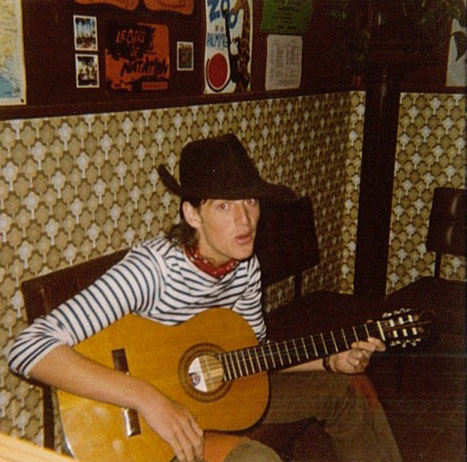
Albert and I had other musical adventures (like the Utrecht Vredenburg gig that never happened in 1979). Oh my, we knew how to have fun in those days!
Cambridge
University was really where it all kicked off. Within days of arriving at Magdalene in October 1974 I had auditioned to join whichever jazz band would have me. The selection process took the form of a jam session in the Cambridge Union disco and I was fortunate to be invited to join the High Society Syncopators, one of the better-known student jazz bands at that time, which certainly endured for two years and possibly longer, under the leadership of trumpet player Geoff Varrall ( through the wonders of modern social media we are now back in touch and plotting some collaboration around Chet Baker tunes).
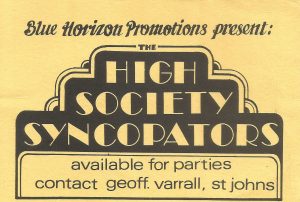
Incidentally, the Union disco was a dark, iniquitous den on a Friday night where I, and my denim-wearing Status Quo-loving pals from St Catharine’s would hang, with much stamping of platform heels to Rebel Rebel and the Ballroom Blitz, The Union disco was also a haunt of the blonde and usually be-denimed Lee who, it transpired, was a genius bass player and who we recruited into The Cockettes in 1977 – but more of that later.
The High Society Syncopators were pretty much part of the establishment – the ‘go to’ jazz band of the moment, and as a consequence we had a lot of fun. We were rooted in trad, played a ton of gigs, appeared at numerous May Balls, and hung out with the nearly and the not so famous backstage. Our line up varied but latterly among those who stepped up were Dave Eastham, clarinet and saxes; John Blackwell, guitar; Phil Feeney, keys; Robin Mitchell, drums; possibly Nic Garnett for the odd gig on trumpet, and others who ‘sat in’ along the way.
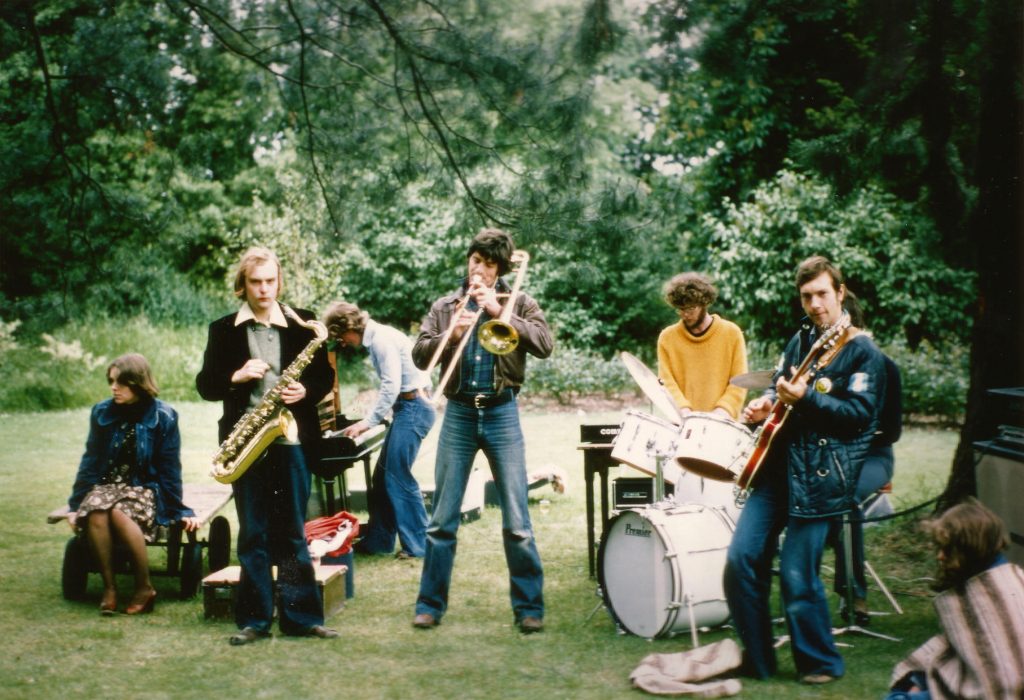
One of the most memorable engagements was the Silver Jubilee street party in 1977. This started off in the courtyard of the The Pickerel Inn. It was a glorious day and, as the afternoon progressed, it was absolutely going like a fair, traffic was obstructed, the Police arrived. I think a helmet, a radio or a police car may even have gone missing! What it was to be a student in those heady times. Who cared? Nobody probably. I Found A New Baby was our usual opening number and inevitably somebody always did just that. You could get a long way for a half of Norwich!
We brought in a raven-haired young lady, an undergraduate supplementing her grant, who sang and wore interesting corsetry, which she removed on stage – one time at a dance at that notorious bastion of propriety (!), the Pitt Club, which is, I believe, now a Pizza Express. Hopefully the jazz tradition lives on. The Syncopators even managed a retrospective mention in Homes and Gardens (in 1978). Fame at last – this was the life.
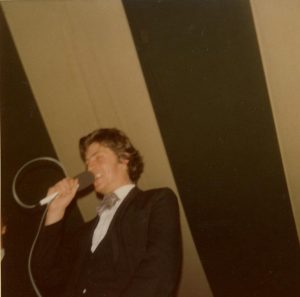
Cambridge was joyous. If ever there was a time not to hide anything, apart from one’s lecture notes (what lecture notes?) under a bushel this was it. Not content with playing jazz however there was a suggestion from another quarter, St Catharine’s, that there was also an opening for more student rock n’ roll.
Toddy Maclean was the instigator. I had known Toddy and many of the St Cats crowd from the early days. I hung out with them before I really knew the guys in Magdalene (and it was an all-male Magdalene then, stolidly single-sex as women were not admitted). We used to drink in the Little Rose opposite the Fitzwilliam Museum, now an Oyster Bar but in 1974 chicken pie and beans was the most expensive choice on the menu. We thought we could give rock a go. We were huge fans of Thin Lizzy, Status Quo and Dr Feelgood and other bands that were booked into the Corn Exchange. This was the real thing, hardcore. Lee Brilleaux, Wilko Johnson, John B Sparks and the Big Figure were our heroes. We knew all the words.
Dick Dick and the Cockettes was modeled on that Canvey Island sound and attitude; we wanted to play dirty-ass rock n’ roll (in the words of the immortal John Cale). We pulled together a line-up with Toddy on guitar (a late 1950s Strat that he treasured), Richard Kemp on keys, Robin Mitchell on drums, and someone got drunk enough to ask Lee to dance and discovered she also played bass. Not just bass, but a purple velvet covered bass. I sang, growled, strutted, and would probably want to curl up and die with embarrassment to see that performance now. We practised, we tried out a few Feelgood songs (Riot in Cell Block #9, You Shouldn’t Call the Doctor and others) and we put together a set that also included numbers borrowed from Nils Lofgren, The Spencer Davis Group and The Kinks. We even had a version of Nutrocker.
We would meet in the Little Rose or the Red Cow (Aussie barmaid, first shot of tequila, and 50 Ways to Leave Your Lover) to make plans.
For a while we lived the look. Crushed suits, leather, denim, Cuban heels. I would pour a can of Newcastle Brown over my head to set my hair before going on stage. We were booked for a few gigs, including the Magdalene May Ball in 1977 where we were asked also to provide backing for a Pans People-type all-girl dance troupe for a routine to Roberta Flack’s Killing Me Softly. The Cockettes playing Killing me Softly – it was never going to work! Fortunately we killed it off, softly, before we reached the gig. We would have been better suited backing the Syncopators’ stripper!

Our usual line up was supplemented for the Ball, bringing in a horn section of Dave on sax and Mike on trumpet, plus Steve on rhythm guitar. Steve had written a number, Homage to Clint, which was in our set list so it was good that he joined us. He was also pretty cool.
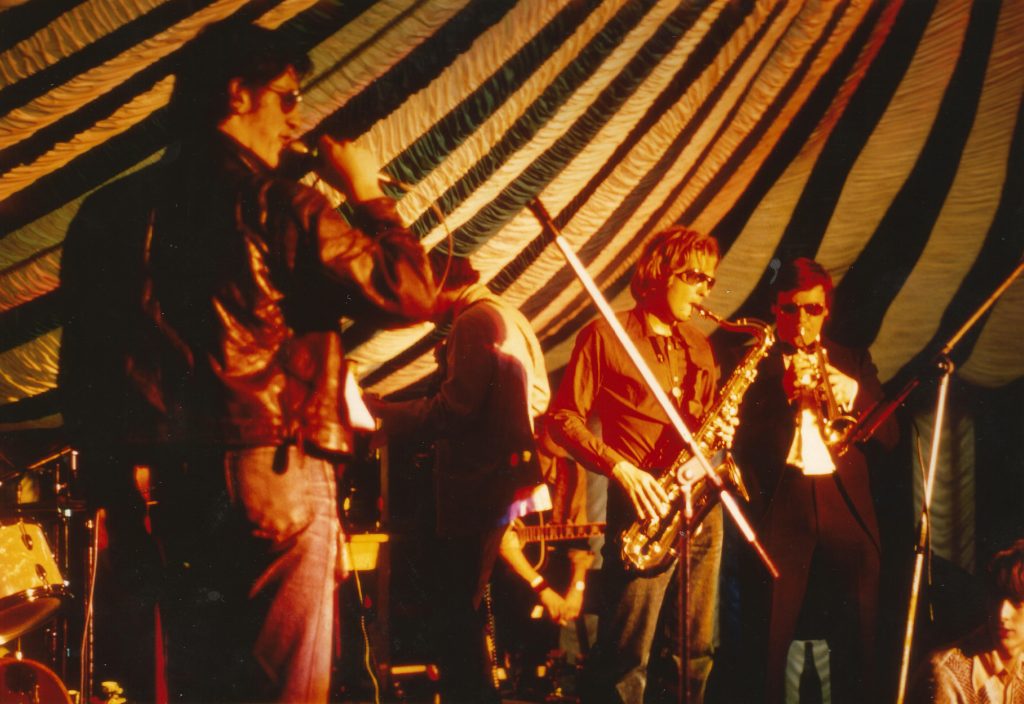
At the May Ball we went on for our second set as dawn was breaking. Shakin’ Stevens and the Sunsets, another huge favourite on the Cambridge ball and party scene, had just wound up at the other end of the garden marquee. They listened for a bit and then joined us on stage. Lights Out!
It could have been the start of something big
Summer 1977 – the heady days of Blondie and early Ultravox. The Damned The Stranglers and John Cale all appeared at the Corn Exchange in the same week – the week of my finals.College May Ball (in June) just gone four a.m. Mist on the river. White ties discarded – now just survivors and hard core seeing it through to the end. The Sunsets, Shakin’ Stevens up front, encored – probably with Cast Iron Arm – on one stage in the garden tent. The Cockettes soundchecked on the other.
We were ripping though our repertoire of rock classics and a few of our own. Todd on his 1959 Strat flayed chopped staccato Feelgood riffs. Lee long hair flying pumped it out on her purple velvet-covered bass. The Sunsets quit listening and dancing. Maybe four of them crepes and drapes joined us all leather jackets greased hair and shades. Suddenly there was Shake on vocals. Ace Skudder sharing the keyboard with Rich for Nutrocker and Rockin’ Louie hitting stuff!
For an hour solid it was full on rock and roll. We belted Lights Out! as the sun came up, and then Homage to Clint. One of Steve’s.
Harry you’re so dirty
But you always hang em high.
You sure ain’t good, you sure ain’t bad
And you watch the ugly die.
We were offered a summer season at Caesar’s Palace – in Luton!
It could have been the start of something big. We turned it down.
London
Like all good things, it had to come to an end. In September 1977 I started with Whitbread, the brewers, on their graduate training programme. This involved four months probation around the country learning how the business worked – not just brewing (in Cheltenham), but sales, marketing, distribution, cellar service, and a spell behind a bar. It was real immersion, at the end of which it was back to London and a desk in the marketing department in Chiswell Street in the City.
Life was good, even if strapped a little by post-University debt and a three-year College bar bill to pay off. But I wasn’t going to survive without music and two strands again pretty much developed in parallel – jazz and rock n’ roll.
Zenoria Breaks was the next jazz foray, the name coming from Zenoria Street in Dulwich where trumpeter Nic Garnett lived and where we rehearsed. I don’t know whose idea it was, or who phoned who, but we found John Moloney, pianist, in Jules Bar on Jermyn Street where he had a residency singing and playing; Bill Faber we found in the bar of the Chelsea Arts Club. Bill was a brilliant rock drummer who was prepared to cross over to jazz and gave the band a raw edge and made us a bit different from a conventional trad jazz band. Nic brought in Chris Clark on saxes and clarinet, and we had a tuba bass player, Adrian, I think.
The band flourished after a fashion, despite our irreverent and rather unorthodox approach. We were booked for smart parties and horsey balls. We played all manner of venues from the Hurlingham Club to the Institute of Directors on Pall Mall, a Faringdon wedding, and Bob Geldof’s birthday party (where he declined to join us on stage incidentally). The apex of the band’s short career was a party at the Chelsea Arts Club to celebrate the Royal Wedding in August 1981. We re-named the band Charlie’s Indiana Knights (well we thought it was funny) and were joined by Nic’s French friend and accomplished jazz guitarist Ray, and a young lady called Susie – I think she might have been a friend of Bill’s – who sang vocals, but with whom we had never rehearsed and who didn’t know the words to any of the numbers. I heard she went on to sing backing vocals with the Moody Blues and is now a successful vocal coach.
Amazingly, some of the evening was recorded using a bog-standard portable tape cassette recorder at the back of the room, and the tape, which equally remarkably survived the test of time, was skillfully converted to digital, so the sound of Zenoria Breaks/Charlie’s Indiana Knights survives! Certainly that evening Reginald Bosanquet, among a number of other luminaries, was up dancing. It may have been that night, as a video recording of the royal wedding on a big screen ran continuously behind the band, that Marianne Faithfull asked to sing (she was living upstairs in the Arts Club at the time).
Any aspiration for more rock n’ roll could have ended in London – but didn’t. Soon after arriving in the capital the Cockettes were booked by a banker friend, Mario, to play at a private house party in Fulham. The band reformed and Lee, with trusty roadie Gordon, came down from Cambridge with the gear in an old yellow Morris 1000 post office van. The party was memorable not just for the band (Toddy, Lee, yours truly and not sure who on drums – it might well have been Robin) but also for the amount of drink available, and consumed. By recollection it came in four colours – pink, blue, green and neutral – vodka with Blue Bols, vodka with Crème de Menthe, vodka with Parfait Amour, and possibly neat vodka. Given the proliferation and strength of the refreshment both the evening and the guests deteriorated. I invited a blonde who worked in the personnel department at Whitbread and who wore leopard skin (not to work I should add).

We were also hired to play a Christmas party for design company, Market Planning. They had an open-plan, loft-type office in Bloomsbury. That night we imported Trevor, director of another design company, on sax and opened with Back In The U.S.S.R. Toddy had an LP of BBC sound effects with one track of a 747 landing, so we used that, cranking up the volume over the opening riffs. It sounded like it was coming through the ceiling for real.
There were other guises, other gigs, and a change in the line-up. Toddy found another advertising man, Julian, to play drums and Adam, who was still at Cambridge at the time, on bass. Another addition was the fabulous Wendy on vocals – she later went on to sing backing vocals for Katrina and the Waves.
We became The Warm Licks, unashamedly plagiarised from the late Dan Hicks and his Hot Licks. Toddy wrote some original songs, some reggae, some punk romance. Memorable titles like You’re Too Nice, Pillow Talk, High School Party and Secret Pirate, inspired by Errol Flynn, the lyrics penned by Toddy’s buddy on the sports desk of the Esher News. We practised at Lavender Sound, a small recording studio on Lavender Hill, just up from Clapham Junction, and also at a far less salubrious address on an industrial estate in London’s east end, Scarf Studios.
My great friend, Mark, a merchant banker and a bit of a fixer, thought we should try for a record deal and somehow through connections organised introductions to Island, Rocket, Magnet and a couple of other record companies. Needless to say we were rejected, on one occasion the arrival of Peter Tosh in the lobby bringing my pitch for the Warm Licks and You’re Too Nice to an early conclusion.
We did however have some notable highs, among them playing the INSEAD Summer Ball at the Chateau Vaux-le-Vicomte outside Paris in the summer of 1981. We appeared in a very smart marquee on a terrace overlooking the gardens and ornamental canal. We had requested a 1000 watt PA but what was delivered was ten times that at least, so when Dick Dick’s Warm Licks – les quatre musiciens qui joueront du New Wave Rock, plus Wendy of course, took to the stage, we were loud!
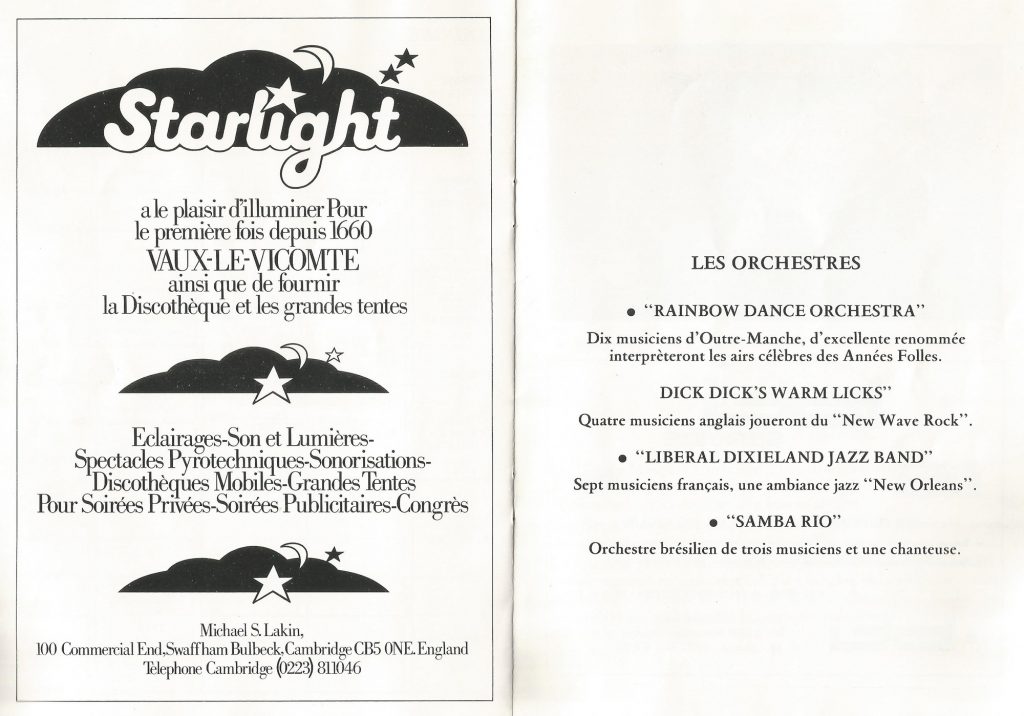
We loved the experience, emptied the mini-bar at the hotel in Melun, lounged by the pool the next day and arrived back in London for a Big Mac at Charing Cross. Musically we thought we had arrived.
Not long afterwards we were back in Cambridge to play the Magdalene May Ball on the same stage where we had performed with Shakin’ four years earlier. We were still playing Feelgood numbers, but also The Cars and Steve Gibbons Band covers, and our own compositions.
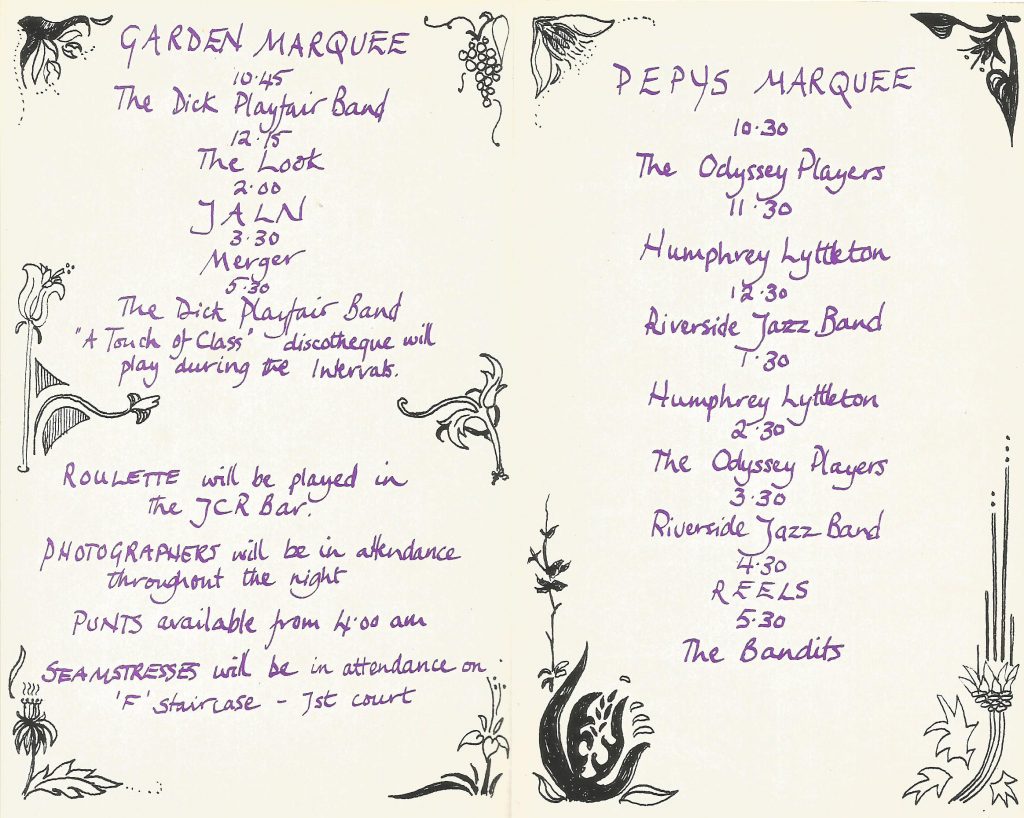
Also that summer we played a posh wedding in Norfolk. Toddy by this time had joined Reuters, and was soon to leave his home in Richmond for an overseas posting. We knew the curtain was falling on this particular chapter. The band kicked ass for the last time and blew the doors off! The next morning we drove up to Blakeney on the coast and bought prawns. I put a bag of the shells, brains and non-edible leggy bits in Toddy’s jacket pocket. He went back to London, hung his jacket in his wardrobe and left for foreign parts. I never told him about the prawns.
They only questioned
When you couldn’t reply.
You hung up your sword
A long time ago.
You worshipped Adolf, but who really cares –
If he didn’t eat meat who was he anyway?
Secret pirate, I guess you always wanted to be the one.
Secret pirate, you were up there on the screen.
Roots, reggae, rock n’roll!
Scotland
In September 1981 I moved to Edinburgh and, for a spell, the music died. There were still requests from the south for bands and I organised Ted Vousden’s band for a friend’s wedding in Rutland and guested with them on trombone. But really it was too much hassle and I was out of the loop.
In 1985 or thereabouts, when I joined Ash Gupta’s agency (Ash continues to light up the Edinburgh blues scene, Jammin’ at the Voodoo etc), he asked me to sing and play some horn for his reformed band Magic Dog. It was fun, it was different, and Ash reeled in a variety of characters from the Edinburgh music scene to join him. I remember a gig at the old Grosvenor Hotel in Grosvenor Street, Edinburgh, where there was Foss Patterson on keys (who played with John Martyn) and the irrepressible Bill Innes on sax. Magic Dog gigged a bit, one of the most notable outings being the Lotus Formula 1 Mechanics’ Party in Norfolk. Most of the band motored down in a hired, beaten-up white mini bus from Edinburgh to East Dereham. That is one dreadful drive, but worth it to be boys on tour!
Another completely unplanned musical interlude happened at the Blue Ball on the Isle of Bute. I was there as a guest, blued up with the rest of them but, for some reason, although the reel band reeled their socks off, the steel band never showed at all. Maybe they missed the ferry. Our host made a plea for anyone with any musical pedigree prepared to save the day/night and fill a space in the entertainment to step up. Bizarrely I found myself singing with Bill Lovelady (She’ll Reggae For It Now) on keyboard, and the late, great Phil Lynott on an upright bass borrowed from the ceilidh band. There must have been a drummer too. We hammered through some rock classics, although my memory of the entire proceedings is now somewhat jaded. At an al fresco breakfast back on the mainland the next morning (kedgeree, boak!) on the lawn of another ancestral pile we were reminiscing about the previous night’s events. “I hadn’t realised that one of the bands failed to show,” said one of the other guests. “If I’d known, I would have phoned my son in law and flown him up by chopper.” Yes, it was Lucy Ferry’s dad.
That was it. I quit while I was ahead.
Clouds
I was diagnosed with rheumatoid arthritis in 2007. What had been just some random and inexplicable aches and pains became, over the next few years, progressively worse to the point that despite the drugs I could barely walk. When I was at my worst, for Christmas I wasn’t given a zimmer, but a cornet!
I decided to teach myself. If I was to be stuck in a chair I could still blow; the breathing might even do me good, and at least I could still move my fingers. It was good fortune that a few months later I was prescribed a very new biological drug to which I responded well and it worked almost immediately. I was back on the tennis court, wind surfing – and by now had developed a passion for the cornet. The penalty though was that it was recommended that I restrict my alcohol intake to five units a week. That, for the curious, is why I don’t drink in this country, except on Christmas Day.
And a silver lining …
I tracked down the brilliant Jonathan Green as my trumpet coach and am still working with him every week. I can genuinely say that trumpet-wise he has taught me everything I know, but he will never teach me everything he knows.
Between then and now there have been a number of different musical ventures, projects, sidelines and interludes. At first, and just to get playing with a few people, there was The Last of the Moxitos. Then there was an urgent appeal for players to join Esk Valley Swing whose line up in the brass section had been reduced to one trombone, Ross, and one trumpet, Stuart, who was shortly departing for Leeds College of Music. Happily EVS is now back almost to full strength with two trumpets and two trombones on a good day, and any combination of those numbers on a bad one (we are always looking for new players, brass and saxes, so if you want a blow do get in touch via the contact page).

Tuesday nights at The Jazz Bar, Edinburgh for its weekly Great Jazz Jam Session, have become a regular feature, and the opportunity to play with some of the greats in my view. The house trio on these nights is among the best you could hope for anywhere. The first time was absolutely nerve-wracking when Bill called me up and every note I thought I had learned, and every break, and every phrase, and possibly even how to hold the horn, went clean out of my head (not much different to now then, eh)?
Tuesday at the Jazz Bar still brings a rush of adrenaline and, depending on who is in that night, sets the nerves jangling. Too numerous to mention, those I’ve met at these sessions have been great fun, hugely supportive, and many I consider friends. So sad that Bill Kyle is no longer with us. Like he did for so many others (he especially loved international guests for the jam sessions), Bill gave me that opportunity to get up and join in the ‘guest action’. As an exercise in confidence building it cannot be beaten. I loved Bill’s smile and accompanying comment when he would hand you a free drink voucher for your efforts – and, if you needed a chart because you weren’t quite sure of something, Bill would disappear off to his office and find the relevant Real Book. Bill was that kind of guy. Missed.
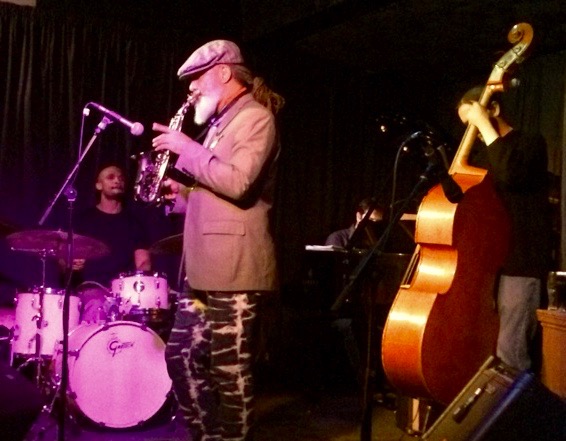
Incidentally, the Jazz Bar is the only bar I have been in ever where there has been a real fight, or where I can remember there being a fight. I’m not a great one for rough pubs! Talk about sticking to your guns, but a young jazz singer making her first appearance in the Jazz Bar at the jam, and no doubt suffering those first timer nerves, suddenly found that the floor smack, bang literally in front of her was taken by two grown men slapping one another about and trying to wrestle each other to the floor over the attentions of a lady I think. There had been a certain amount of what I assume to be activity of an extra-marital nature going on stage left throughout the session. The doormen arrived and round one came to a somewhat clumsy end of half-thrown punches, arms forced up behind backs, and some forceful escorting towards the door. There were no chairs thrown, no bottles or mirrors shattered behind the bar, no tables or chairs kicked over, no prostrate bodies. But it was still a fight. The band played on regardless. Angela, stalwart at the mic, never batted an eyelid either. Baptism of fire!
I’ve attended the Richard Michael Jazz Summer School at Kilgraston in Perthshire twice. I cannot commend it enough – not only is Richard an amazing course leader, tutor and motivator, but the quality of all the coaches at Kilgraston is incredible. Some line up! Kevin Ferris (trumpet), Gordon McNeill (sax), Euan Stephenson (piano), Mario Caribé (bass), Tom Gordon (drums), Eliot Murray (just about everything else) to name only a few. Brilliantly organised, as an introduction to playing jazz, or for working on jazz skills and repertoire, or meeting some really great people with the same interest it fronts on all scores. Out of Kilgraston came another project Blow the Shed, a septet who just wanted to keep on going. BTS may have run its course now, but we are all playing and having fun in various different formats.
Then there was the run at the Assembly Roxy at the Edinburgh Festival Fringe with Helene and Bonsoir Monsieur Nightfall. That was some experience (and a tick off the musical bucket list) – a performance every night of the entire Fringe, with a few additional gigs thrown in at the National Museum of Scotland’s Free Fringe, the BBC Pink Tent, Mervyn Stutter’s Pick of the Fringe, the Assembly Spiegeltent twice, Lili La Scala’s Another F****** Cabaret Show! The band varied in personnel and number nightly but Helene was never without one guitarist and one trumpet player, as well as her own guitar. In the changing line-up were David Midas and Andy Shuttleworth (guitars); Keith Bowden, Damian Mole, Jon Green, Tomas Marada, and your truly (horns); Lynsey Shuttleworth (percussion); David Huggan (bass); and Vicky Falconer-Pritchard (accordion) joining the band for the very final night.
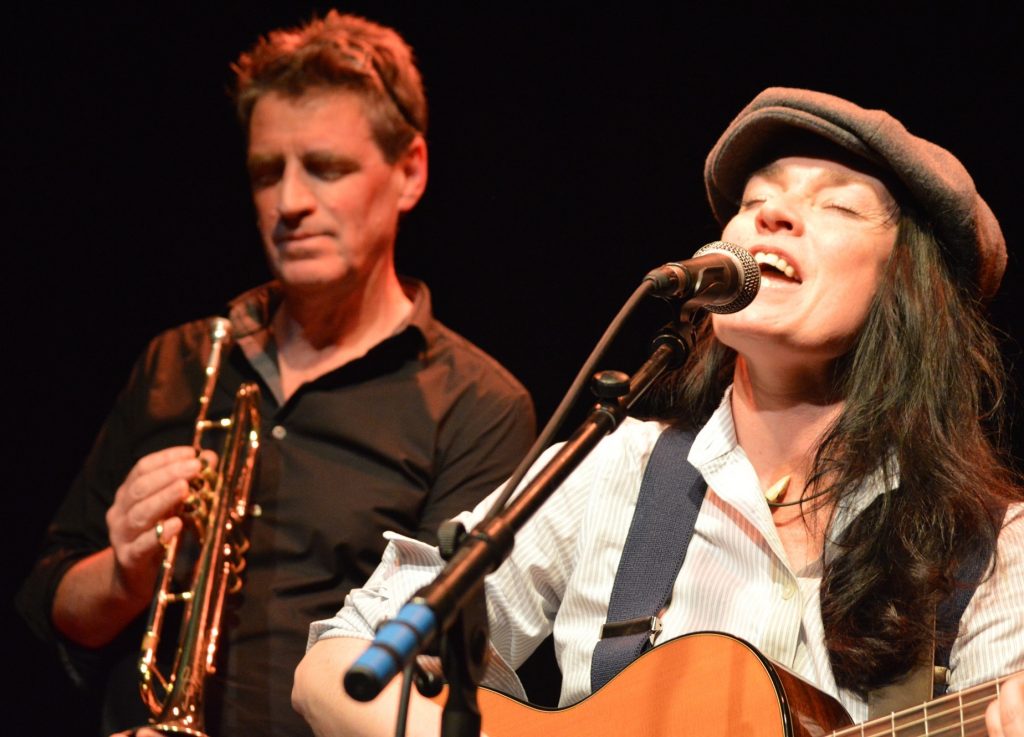
Bucket list item No 2: to play in Paris, and that opportunity came on the night of my big birthday celebration when, with a group of good friends, we decided to enjoy the after-midnight jam session at the world-renowned jazz club, the Duc des Lombards. With very little persuasion, allegedly, I joined the house trio and other guests for one number. What tune do you call in such surroundings though, particularly when the singer up before you has given a great rendition of Love for Sale, the song you had in mind? But that’s the Murphy’s law of jam sessions (Bill Flucker did it to me once in Whigham’s also). My pal Ivor had been harassing the house pianist at Le Duc, and who probably didn’t understand a word he was saying anyway, to get me further up the queue for the jam which finished at 4.00am incidentally.
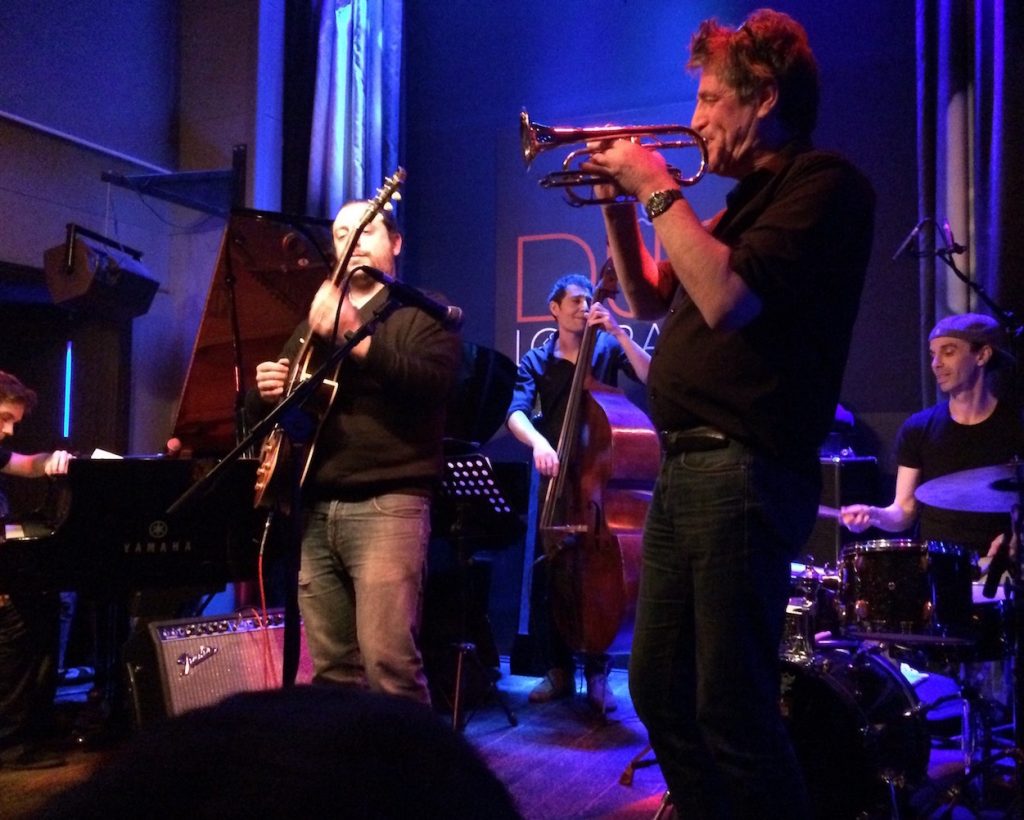
Subsequently another visit to Paris, coinciding with that of a couple of other Blow the Shed chums resulted in a late night session at another venue La Cave du 38 Riv’ on the rue de Rivoli, again a venue that I would commend for its welcome and ambience for anyone heading in that direction and wanting to sit in – or stand if you prefer.
Brasstrapped!
In the summer of 2016, I decided to resurrect the trombone playing too. My trombone had been untouched for more than 25 years, away in its case in a cupboard. It works, the slide is still good despite a little corrosion, but it demands different chops from those for the trumpet. With a bit of work I hope to get back to where I once was on it – but this time more Curtis Fuller or JJ Johnson than Kid Ory or George Brunies.
My last acquisition was a Conn Victor 4H trombone. This model was produced continuously from 1919 to 1958 and mine dates from 1928 in superb condition.
So now the trombone has a regular outing most Wednesdays at big band unless the trumpet section, where I used to sit (in fact shortly after I joined the band I was the trumpet section!), is depleted, in which case I’ll switch back.
There is a lot I have to be grateful for, and more than a few people to thank, including all those mentioned here, who have helped me gain such pleasure from playing music, and who have given me advice, encouragement and the occasional raised eyebrow along the way. Long may that journey continue.
More to follow …..